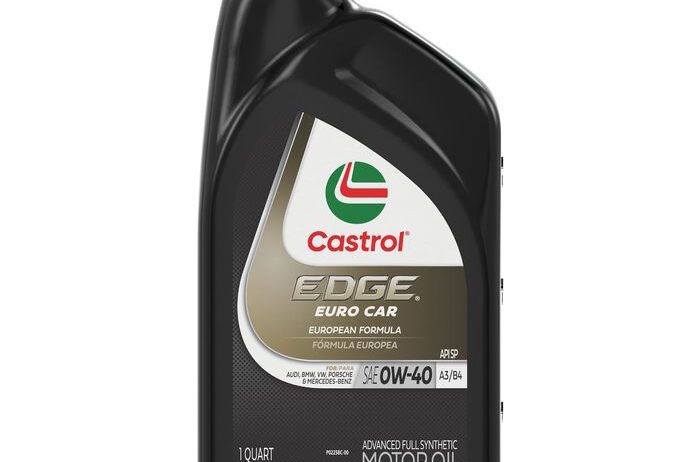In a world increasingly dominated by concerns over sustainability and energy conservation, the choice of motor oil may seem trivial. However, one might wonder: Is Castrol 0W-40 an energy-conserving motor oil? This inquiry invites both examination of the product’s properties and a broader discussion on how engine oils can contribute to energy efficiency. Let us embark on this exploration, understanding the implications of motor oil on both vehicle performance and environmental impact.
First, it is vital to understand what 0W-40 signifies. The “0W” indicates that the oil has a low viscosity at low temperatures, ensuring optimal flow even in frigid conditions. This characteristic facilitates easier engine starts and reduces the energy required to crank the engine, ultimately contributing to overall fuel efficiency. The “40” denotes its viscosity at higher temperatures, which ensures adequate lubrication and protection under operating conditions, further enhancing engine performance.
One of the primary benefits of using synthetic oils, such as Castrol’s 0W-40 formulation, is their thermal stability. Unlike conventional oils that can break down under high temperatures, synthetic oils maintain their properties over a broader temperature range. This stability translates into less frequent oil changes, which not only saves money but also reduces the environmental burden associated with oil disposal and production.
Are you beginning to see how playing the long game with your engine’s lubrication can yield dividends? Well, let’s delve deeper into the benefits offered by synthetic oil. Because Castrol 0W-40 is designed to minimize friction between engine components, it enhances fuel efficiency. When engine parts interact with minimal resistance, the vehicle requires less power to operate, resulting in better mileage. In a time where fuel prices vary wildly and environmental regulations tighten, optimizing fuel consumption can significantly reduce a driver’s carbon footprint.
Moreover, synthetic oils often contain additives that provide additional benefits. For instance, detergents present in Castrol 0W-40 help maintain engine cleanliness by preventing the formation of sludge and deposits. Cleaner engines run more efficiently and have a longer lifespan, thereby contributing to energy conservation. The durability factor here is not just beneficial for the vehicle owner; it aligns with the larger goals of reducing resource consumption and promoting sustainability.
Yet, it poses an intriguing challenge: Can a motor oil directly correlate with energy conservation when viewed against the backdrop of vehicle manufacturing and disposal? The oil is only part of a more extensive system. While a high-quality lubricant can enhance efficiency and longevity of the vehicle, it is essential to consider the entire lifecycle of both the motor oil and the vehicle itself. The extraction, refining, and eventual disposal of motor oil all contribute to its environmental impact. This circular concern expands beyond automotive enthusiasts to every consumer aware of their carbon footprint.
Furthermore, various studies have demonstrated that the use of energy-conserving oils can lead to a reduction in greenhouse gas emissions. When less fuel is burned to power an engine, there’s a direct correlation with decreased emissions. Thus, Castrol 0W-40 not only aids in maximizing engine performance but also plays a role in helping manufacturers meet stringent emissions standards, a necessity in today’s regulatory landscape.
Now, let’s pivot to discussion about the shelf life and storage of synthetic oils like Castrol 0W-40. While synthetic oils boast impressive longevity, how one stores and handles these products also affects their performance. Improper storage can lead to chemical breakdown, which diminishes effectiveness. Therefore, it’s imperative to treat motor oil with the respect it deserves — not just for your vehicle, but for energy conservation as a whole.
Engaging in preventive maintenance is another aspect where Castrol 0W-40 can shine. Keeping engines well-lubricated leads to fewer mechanical issues and extended life of a vehicle. Owners benefit both economically and environmentally by delaying the need for a new car – a decision that inherently consumes substantial resources from manufacturing to assembly and, ultimately, disposal.
Yet, the question remains: Is it feasible to label Castrol 0W-40 as overtly energy-conserving? While its multifaceted attributes, such as improved fuel economy, reduced emissions, and extended engine life, support a strong argument for its effectiveness, it is crucial to understand the holistic context of oil consumption. The onus of energy conservation does not rest solely on product innovation; consumer behavior and broader systemic changes in manufacturing and disposal practices are equally important.
In conclusion, Castrol 0W-40 motor oil serves as a solid illustration of how modern advancements in chemical engineering can lead to energy conservation. Its design promotes efficiency and longevity, and its contributions extend beyond individual vehicle performance to larger environmental considerations. As more consumers opt for sustainable choices, the demand for innovative products will likely increase. Thus, as we fuel our vehicles and ambitions, let us consider the impact of every drop of oil and its role in our quest for a more sustainable future.







